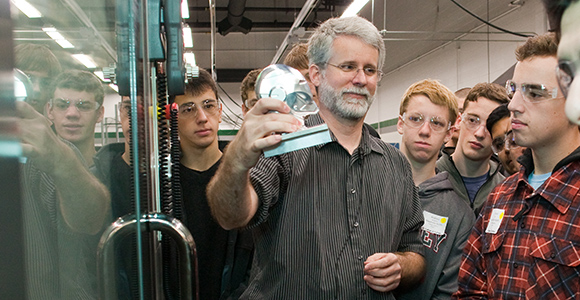
(Photo Credit: COD Newsroom/Flickr)
California employers are urging the Legislature to fully fund two promising programs this year with $250 million to bolster the state’s workforce.
A letter to key legislators from the Regional Economic Association Leaders of California (REAL Coalition), which represents more than 15,000 employers, makes the case succinctly to approve $200 million for the Strong Workforce Program and a $48-million annual commitment to the Career Technical Education Pathways Program:
“Our state’s goal should be to connect more workers with well-paying jobs by promoting collaboration between employers and the regions’ vast network of work training programs from K-12 school and community colleges to workforce investment boards and community-based organizations,” says the REAL letter.
The California Economic Summit called out the workforce issue last year by issuing the challenge of producing one million middle-skill workers in California. It’s estimated the state will need that many to fill moderate-income jobs requiring certifications in the next 10 years.
Millions of Californians are struggling to make ends meet in low-wage jobs and wages are stagnating. Yet, at the same time, many industries are still struggling to find skilled workers. The Summit has set a goal of closing this looming “skills gap” by supporting the formation of regional civic organizations that can align the state’s job training and education programs, like career technical education (CTE), with the needs of employers.
This workforce issue has raised the profile of the California Community Colleges, which launched the “Doing What Matters for Jobs and Economy” initiative to address the problem. A Task Force was formed to eventually craft more than two dozen recommendations on how the Community Colleges can be more nimble and more effective in helping train workers for our dynamic economy. Many organizations and businesses have been publicly supporting the legislation.
But its employers like Kevin Devine, director of engineering for Brookfield Office Properties in Los Angeles, who are making the real-world case to the Legislature.
“For California’s future commercial real estate operations talent pool to maintain and even expand its place as a leading global economic power, we must make sure that our workers are prepared for the 21st century economy and tomorrow’s intelligent building’s technical needs that is already underway,” said Devine.
“Making sure that the California Community Colleges are part of that solution is critical, which is why we support the CTE funding currently that the Legislature and Governor are considering. It is essential that we have a constant well trained skilled workforce in development to operate future HVAC systems that will inevitably support the businesses and institutions in this fine state.”
Brookfield Office Properties is a global office property company that manages assets in dynamic markets, and finding workers who can work in an industry that is changing fast because of technology and California’s Zero Net Energy mandates is vital.
The story is the same at the utilities in California where new technology and new equipment are creating the demand for newly-trained workers.
“We’re hiring hundreds of qualified electrical workers each year,” Pete Dietrich, a senior vice president at Southern California Edison, said in an interview with California Forward. “There’s a tremendous opportunity for us to partner with community colleges to identify areas and locations where we can target young student to explain career opportunities.”
The CTE funding will accelerate adoption of training and certificate programs in the community colleges to support the workforce needs of the regions the colleges serve.
The Legislature is expected to vote on the proposal sometime before the budget is approved, which must happen by June 15.

